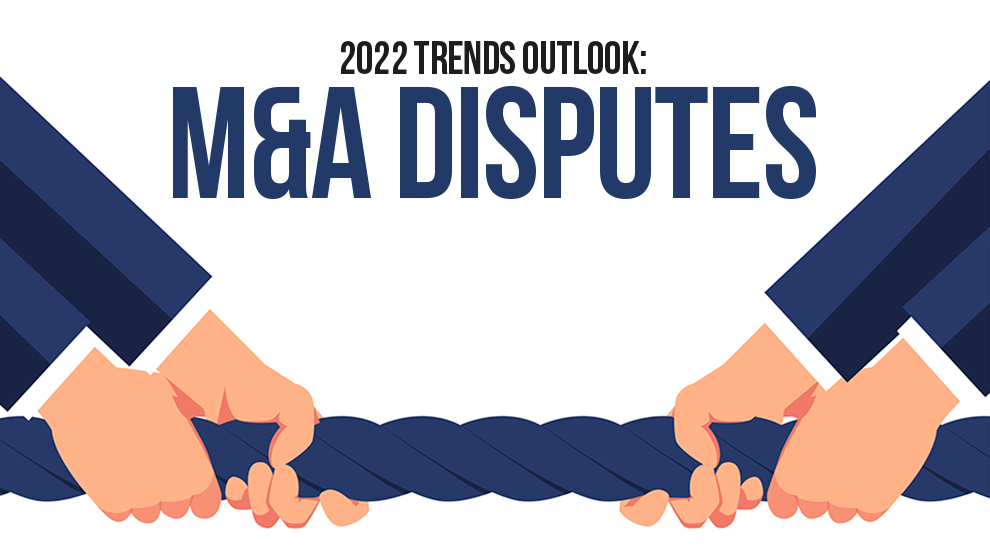This month we have the privilege of hearing from Ali Kirby-Harris, James Kennedy and Samantha Trevan, partners at Freshfields Bruckhaus Deringer, as they discuss key themes emerging from M&A disputes over the last year and look ahead to trends they expect to see in 2022.
Times of economic turmoil have historically generated significant litigation activity. The COVID-19 pandemic and its economic fallout are no exception. They have resulted in a proliferation of litigation from M&A deals, and their impact is set to continue well beyond 2021. Here, we take a brief look back at key drivers and shifting trends in M&A litigation in the last year, and then do some crystal ball gazing about what we expect to see in the coming 12 months.
Looking back
The past 12 months have undoubtedly seen a boom in M&A disputes, in both the English courts and arbitration centres. Between 2019 and 2021, there has reportedly been a significant increase in High Court claims arising out of M&A transactions, and the last year has seen record numbers of claims filed at the London Court of International Arbitration (LCIA) and the International Chamber of Commerce (ICC), much of that driven by M&A activity.
This uptick in M&A disputes appears to have been driven by a few factors. The most obvious, and most closely-related to the pandemic, can be loosely described as claims stemming from buyer’s remorse: buyers scouring boilerplate clauses for a way out when deals looked considerably less attractive after the pandemic hit (force majeure and material adverse change disputes being the clearest examples), looking to exploit ambiguities in the drafting of SPAs to their maximum advantage, and threatening to bring claims for misrepresentation, often angling to re-open the deal or re-haggle the price. Litigation has also been increasingly hard-fought, with Commercial Court judges reporting receiving more, lengthier applications in which parties attempt to take every point.
Between 2019 and 2021, there has reportedly been a significant increase in High Court claims arising out of M&A transactions.
But if we dig a little deeper, themes emerge which are unrelated (or at least far more loosely related) to the pandemic. To take a couple of examples, in recent times we have witnessed in the M&A market the more widespread adoption of warranty & indemnity insurance (W&I insurance), and buyers seeking more comprehensive coverage. Undoubtedly, this shift has supported those same buyers pursuing claims for breach of warranties and indemnities.
It has also been a year in which ESG concerns have risen even further up the agenda of many corporates, including finding their way to the lawyers’ desks. This has become yet another area where parties have sought to gain advantage in M&A deals, particularly in looking to enforce ESG warranty breaches, such as where target companies have failed to maintain their own ESG targets.
Looking forward – what to expect
Looking ahead, it appears that the trend of increased claims arising out of M&A is likely to continue – at least in the short term.
On the one hand, the outlook for the next year suggests strong M&A markets and a continued uptick in M&A activity. Many investors have record levels of funds available to invest, and competition for assets is fierce amongst buyers; approaches for prize targets increasingly descend into hyper-competitive auction processes. We have therefore already seen, and expect to continue to see, more focus from buyers on expediting deals and due diligence processes, leading to an increased likelihood of follow-on M&A litigation (focussed on securing price adjustments, and questioning the adequacy of disclosures given during the sale).
The outlook for the next year suggests strong M&A markets and a continued uptick in M&A activity.
Whilst some companies are seeking to move quickly and actively take advantage of market circumstances, other players in the markets are struggling to adapt and are shrinking back to their core businesses, markets and geographies. Both types of companies may be exposed to M&A litigation risk in different ways.
Increasingly hands-on government intervention and regulation is likely to be another factor fuelling post-M&A litigation in the coming year. For many years, anti-trust processes connected to M&A activity have become increasingly complex and contentious. For many buyers, this adds yet another reason to condense the parts of a deal timetable that are within their control, shrinking the time allowed to negotiate a deal and condensing the diligence phase further. To build on this trend, 2022 will see the introduction of the UK’s new investment regime in the form of the National Security and Investment Act, adding yet a further layer of uncertainty for deals in certain sectors. In short, the wider geopolitical landscape remains volatile, and that volatility is likely to fuel disputes.
Finally, when we look ahead to trends in M&A disputes in the coming year, it would be remiss not to consider the differing sensitivities in different sectors. First, retail and travel: two of the hardest hit sectors in the UK economy. As the many years following the financial crisis heralded an explosion of litigation involving the financial sector, so the retail and travel sectors are likely to assume that position in the wake of the COVID-19 pandemic. Beleaguered companies and deals gone sour are likely to arise more and more in those sectors in the coming 12 months.
[ymal]
But secondly, and importantly, many institutional investors are venturing further into more specialist sectors, requiring sophisticated regulatory know-how, including tapping into the explosion of deals in the fintech and healthcare sectors. These sectors give rise to real M&A opportunity, but careful and specialised advice is needed to avoid significant litigation risk later down the road.
Overall, the marked increase in M&A disputes that so many of us have seen in the past year seems only set to continue (and that is without even speculating about the much-anticipated boon in SPAC-related litigation). There is much that can be done during the deal process to protect against disputes arising, and parties would be well advised to redouble their efforts. Buyer beware? In the current market we would extend that caution to both parties.
Alison Kirby-Harris, James Kennedy and Samantha Trevan, Partners
Freshfields Bruckhaus Deringer
100 Bishopsgate, London EC2P 2SR
Tel: +44 20 7716 4227 / +44 20 7936 4000 / +44 20 7936 4000
E: alison.kirby-harris@freshfields.com / james.kennedy@freshfields.com / samantha.trevan@freshfields.com
Ali Kirby-Harris is a partner in Freshfields’ dispute resolution team with a wide-ranging practice based on managing cross-border commercial litigation and global internal and criminal investigations. Ali has significant experience advising on pre- and post-M&A disputes, advising both corporates and financial investors.
James Kennedy is a London dispute resolution partner who acts for clients in large-scale commercial disputes, often involving multi-jurisdictional civil and arbitral proceedings (particularly in or concerning assets in Africa, Russia/the CIS and various offshore jurisdictions). James has particular expertise in the telecoms, technology, sports media, energy and healthcare sectors.
Samantha Trevan leads Freshfields’ corporate disputes group in London and advises a broad range of clients on their commercial disputes. She has particular experience in complex, high-value, cross-border litigation, which often arises in the context of large M&A transactions.
Freshfields Bruckhaus Deringer is a global law firm with a long track record of successfully advising the world's leading national and multinational corporations and financial institutions on ground breaking and business-critical challenges. Freshfields’ team of more than 2,800 lawyers and other legal professionals delivers global results from 28 offices worldwide.





















